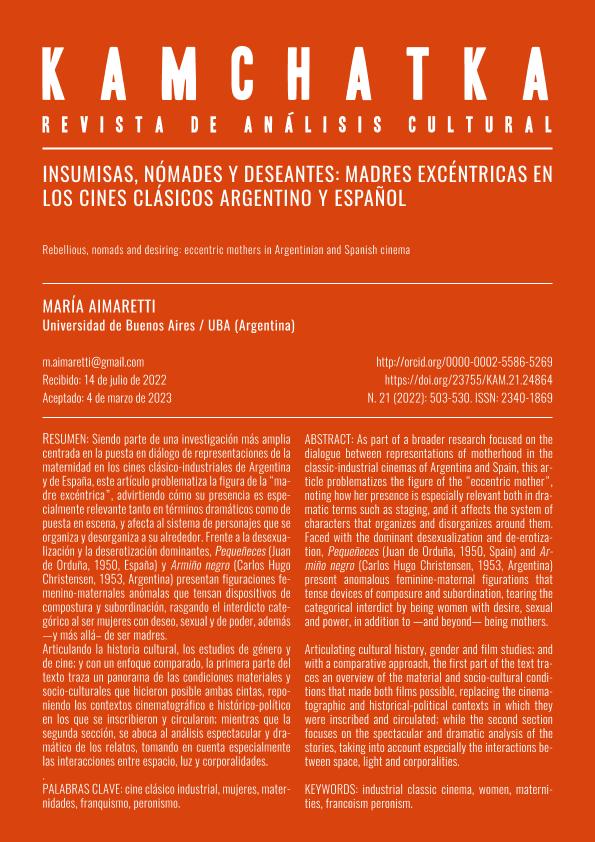Artículo
Siendo parte de una investigación más amplia centrada en la puesta en diálogo de representaciones de la maternidad en los cines clásico-industriales de Argentina y de España, este artículo problematiza la figura de la “madre excéntrica”, advirtiendo cómo su presencia es especialmente relevante tanto en términos dramáticos como de puesta en escena, y afecta al sistema de personajes que se organiza y desorganiza a su alrededor. Frente a la desexualización y la deserotización dominantes, Pequeñeces (Juan de Orduña, 1950, España) y Armiño negro (Carlos Hugo Christensen, 1953, Argentina) presentan figuraciones femenino-maternales anómalas que tensan dispositivos de compostura y subordinación, rasgando el interdicto categórico al ser mujeres con deseo, sexual y de poder, además —y más allá– de ser madres.Articulando la historia cultural, los estudios de género y de cine; y con un enfoque comparado, la primera parte del texto traza un panorama de las condiciones materiales y socio-culturales que hicieron posible ambas cintas, reponiendo los contextos cinematográfico e histórico-político en los que se inscribieron y circularon; mientras que la segunda sección, se aboca al análisis espectacular y dramático de los relatos, tomando en cuenta especialmente las interacciones entre espacio, luz y corporalidades. As part of a broader research focused on the dialogue between representations of motherhood in the classic-industrial cinemas of Argentina and Spain, this article problematizes the figure of the “eccentric mother”, noting how her presence is especially relevant both in dramatic terms such as staging, and it affects the system of characters that organizes and disorganizes around them. Faced with the dominant desexualization and de-erotization, Pequeñeces (Juan de Orduña, 1950, Spain) and Armiño negro (Carlos Hugo Christensen, 1953, Argentina) present anomalous feminine-maternal figurations that tense devices of composure and subordination, tearing the categorical interdict by being women with desire, sexual and power, in addition to —and beyond— being mothers. Articulating cultural history, gender and film studies; and with a comparative approach, the first part of the text traces an overview of the material and socio-cultural conditions that made both films possible, replacing the cinematographic and historical-political contexts in which they were inscribed and circulated; while the second section focuses on the spectacular and dramatic analysis of the stories, taking into account especially the interactions between space, light and corporalities.
Insumisas, nómades y deseantes: Madres excéntricas en los cines clásicos argentino y español
Título:
Rebellious, nomads and desiring: Eccentric mothers in Argentinian and Spanish cinema
Fecha de publicación:
07/2023
Editorial:
Universitat de València. Departamento de Filología Española
Revista:
Kamchatka
ISSN:
2340-1869
Idioma:
Español
Tipo de recurso:
Artículo publicado
Clasificación temática:
Resumen
Palabras clave:
CINE CLASICO INDUSTRIAL
,
MUJERES
,
MATERNIDADES
Archivos asociados
Licencia
Identificadores
Colecciones
Articulos(SEDE CENTRAL)
Articulos de SEDE CENTRAL
Articulos de SEDE CENTRAL
Citación
Aimaretti, Maria Gabriela; Insumisas, nómades y deseantes: Madres excéntricas en los cines clásicos argentino y español; Universitat de València. Departamento de Filología Española; Kamchatka; 21; 7-2023; 503-530
Compartir
Altmétricas




